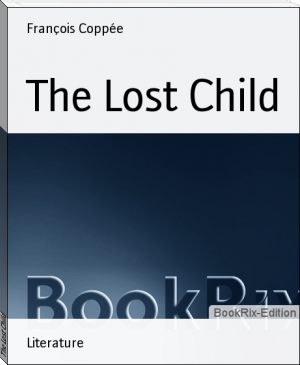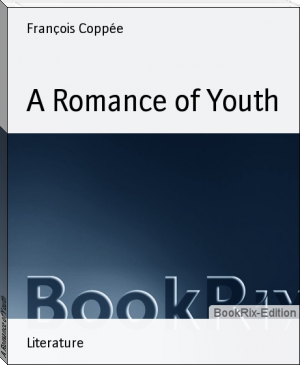International Short Stories: French - - (new books to read .TXT) 📗

- Author: -
- Performer: -
Book online «International Short Stories: French - - (new books to read .TXT) 📗». Author -
Croisilles, who for a whole hour had followed him with a palpitating heart, as may be imagined, was not a little disappointed at this silent retreat. He thought that perhaps the Jew had wished to give himself time to reflect and that he would return presently. He waited a week for him, not daring to go out for fear of missing his visit, and looking out of the windows from morning till night. But it was in vain; the Jew did not reappear. Jean, true to his unpleasant rôle of adviser, brought moral pressure to bear to dissuade his master from selling his house in so hasty a manner and for so extravagant a purpose. Dying of impatience, ennui, and love, Croisilles one morning took his two hundred louis and went out, determined to tempt fortune with this sum, since he could not have more.
The gaming-houses at that time were not public, and that refinement of civilization which enables the first comer to ruin himself at all hours, as soon as the wish enters his mind, had not yet been invented.
Scarcely was Croisilles in the street before he stopped, not knowing where to go to stake his money. He looked at the houses of the neighborhood, and eyed them, one after the other, striving to discover suspicious appearances that might point out to him the object of his search. A good-looking young man, splendidly dressed, happened to pass. Judging from his mien, he was certainly a young man of gentle blood and ample leisure, so Croisilles politely accosted him.
“Sir,” he said, “I beg your pardon for the liberty I take. I have two hundred louis in my pocket and I am dying either to lose them or win more. Could you not point out to me some respectable place where such things are done?”
At this rather strange speech the young man burst out laughing.
“Upon my word, sir!” answered he, “if you are seeking any such wicked place you have but to follow me, for that is just where I am going.”
Croisilles followed him, and a few steps farther they both entered a house of very attractive appearance, where they were received hospitably by an old gentleman of the highest breeding.
Several young men were already seated round a green cloth. Croisilles modestly took a place there, and in less than an hour his two hundred louis were gone.
He came out as sad as a lover can be who thinks himself beloved. He had not enough to dine with, but that did not cause him any anxiety.
“What can I do now,” he asked himself, “to get money? To whom shall I address myself in this town? Who will lend me even a hundred louis on this house that I can not sell?”
While he was in this quandary, he met his Jewish broker. He did not hesitate to address him, and, featherhead as he was, did not fail to tell him the plight he was in.
The Jew did not much want to buy the house; he had come to see it only through curiosity, or, to speak more exactly, for the satisfaction of his own conscience, as a passing dog goes into a kitchen, the door of which stands open, to see if there is anything to steal. But when he saw Croisilles so despondent, so sad, so bereft of all resources, he could not resist the temptation to put himself to some inconvenience, even, in order to pay for the house. He therefore offered him about one-fourth of its value. Croisilles fell upon his neck, called him his friend and saviour, blindly signed a bargain that would have made one’s hair stand on end, and, on the very next day, the possessor of four hundred new louis, he once more turned his steps toward the gambling-house where he had been so politely and speedily ruined the night before.
On his way, he passed by the wharf. A vessel was about leaving; the wind was gentle, the ocean tranquil. On all sides, merchants, sailors, officers in uniform were coming and going. Porters were carrying enormous bales of merchandise. Passengers and their friends were exchanging farewells, small boats were rowing about in all directions; on every face could be read fear, impatience, or hope; and, amidst all the agitation which surrounded it, the majestic vessel swayed gently to and fro under the wind that swelled her proud sails.
“What a grand thing it is,” thought Croisilles, “to risk all one possesses and go beyond the sea, in perilous search of fortune! How it fills me with emotion to look at this vessel setting out on her voyage, loaded with so much wealth, with the welfare of so many families! What joy to see her come back again, bringing twice as much as was intrusted to her, returning so much prouder and richer than she went away! Why am I not one of those merchants? Why could I not stake my four hundred louis in this way? This immense sea! What a green cloth, on which to boldly tempt fortune! Why should I not myself buy a few bales of cloth or silk? What is to prevent my doing so, since I have gold? Why should this captain refuse to take charge of my merchandise? And who knows? Instead of going and throwing away this—my little all—in a gambling-house, I might double it, I might triple it, perhaps, by honest industry. If Julie truly loves me, she will wait a few years, she will remain true to me until I am able to marry her. Commerce sometimes yields greater profits than one thinks; examples are wanting in this world of wealth gained with astonishing rapidity in this way on the changing waves—why should Providence not bless an endeavor made for a purpose so laudable, so worthy of His assistance? Among these merchants who have accumulated so much and who send their vessels to the ends of the world, more than one has begun with a smaller sum than I have now. They have prospered with the help of God; why should I not prosper in my turn? It seems to me as though a good wind were filling these sails, and this vessel inspires confidence. Come! the die is cast; I will speak to the captain, who seems to be a good fellow; I will then write to Julie, and set out to become a clever and successful trader.”
The greatest danger incurred by those who are habitually but half crazy, is that of becoming, at times, altogether so.
The poor fellow, without further deliberation, put his whim into execution. To find goods to buy, when one has money and knows nothing about the goods, is the easiest thing in the world.
The captain, to oblige Croisilles, took him to one of his friends, a manufacturer, who sold him as much cloth and silk as he could pay for. The whole of it, loaded upon a cart, was promptly taken on board. Croisilles, delighted and full of hope, had himself written in large letters his name upon the bales. He watched them being put on board with inexpressible joy; the hour of departure soon came, and the vessel weighed anchor.
VII need not say that in this transaction, Croisilles had kept no money in hand. His house was sold; and there remained to him, for his sole fortune, the clothes he had on his back;—no home, and not a son. With the best will possible, Jean could not suppose that his master was reduced to such an extremity; Croisilles was not too proud, but too thoughtless to tell him of it. So he determined to sleep under the starry vault, and as for his meals, he made the following calculation; he presumed that the vessel which bore his fortune would be six months before coming back to Havre; Croisilles, therefore, not without regret, sold a gold watch his father had given him, and which he had fortunately kept; he got thirty-six livres for it. That was sufficient to live on for about six months, at the rate of four sous a day. He did not doubt that it would be enough, and, reassured for the present, he wrote to Mademoiselle Godeau to inform her of what he had done. He was very careful in his letter not to speak of his distress; he announced to her, on the contrary, that he had undertaken a magnificent commercial enterprise, of the speedy and fortunate issue of which there could be no doubt; he explained to her that La Fleurette, a merchant-vessel of one hundred and fifty tons, was carrying to the Baltic his cloths and his silks, and implored her to remain faithful to him for a year, reserving to himself the right of asking, later on, for a further delay, while, for his part, he swore eternal love to her.
When Mademoiselle Godeau received this letter she was sitting before the fire, and had in her hand, using it as a screen, one of those bulletins which are printed in seaports, announcing the arrival and departure of vessels, and which also report disasters at sea. It had never occurred to her, as one can well imagine, to take an interest in this sort of thing; she had in fact never glanced at any of these sheets.
The perusal of Croisilles’ letter prompted her to read the bulletin she had been holding in her hand; the first word that caught her eye was no other than the name of La Fleurette.
The vessel had been wrecked on the coast of France, on the very night following its departure. The crew had barely escaped, but all the cargo was lost.
Mademoiselle Godeau, at this news, no longer remembered that Croisilles had made to her an avowal of his poverty; she was as heartbroken as though a million had been at stake.
In an instant, the horrors of the tempest, the fury of the winds, the cries of the drowning, the ruin of the man who loved her, presented themselves to her mind like a scene in a romance. The bulletin and the letter fell from her hands. She rose in great agitation, and, with heaving breast and eyes brimming with tears, paced up and down, determined to act, and asking herself how she should act.
There is one thing that must be said in justice to love; it is that the stronger, the clearer, the simpler the considerations opposed to it, in a word, the less common sense there is in the matter, the wilder does the passion become and the more does the lover love. It is one of the most beautiful things under heaven, this irrationality of the heart. We should not be worth much without it. After having walked about the room (without forgetting either her dear fan or the passing glance at the mirror), Julie allowed herself to sink once more upon her lounge. Whoever had seen her at this moment would have looked upon a lovely sight; her eyes sparkled, her cheeks were on fire; she sighed deeply, and murmured in a delicious transport of joy and pain:
“Poor fellow! He has ruined himself for me!”
Independently of the fortune which she could expect from her father, Mademoiselle Godeau had in her own right the property her mother had left her. She had never thought of it.
At this moment, for the first time in her life, she remembered that she could dispose of five hundred thousand francs. This thought brought a smile to her lips; a project, strange, bold, wholly feminine, almost as mad as Croisilles himself, entered her head;—she weighed the idea in her mind for some time, then decided to act upon it at once.
She began by inquiring whether Croisilles had any relatives or friends; the maid was sent out in all directions to find out.
Having made minute inquiries in all quarters, she discovered, on the fourth floor of an old rickety house, a





Comments (0)